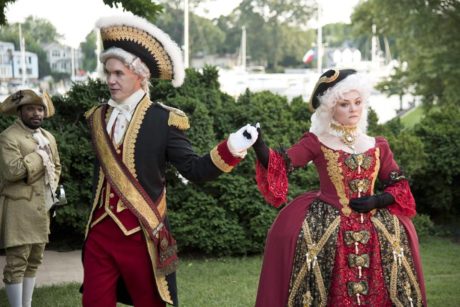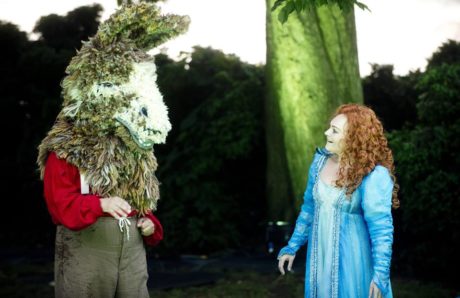Annapolis Shakespeare Company’s production of A Midsummer Night’s Dream, directed by Sally Boyett and Donald Hicken, is the perfect combination of play and space. Performed in the garden of the Charles Carroll House, designed in 1770 by the only Catholic signer of the Declaration of Independence, there are few props, but beautiful costuming, excellent use of lighting, and talented actors all help to create an enchanted evening’s entertainment down by the water.

The costumes, as befitting the setting, are 18th-Century inspired, with wigs and tricorner hats for the men, and big skirts for the women. Theseus (Brian Keith MacDonald) and Hippolyta (Renata Plecha) enter the stage from the top of the hill looking very much like King George III and his wife.
The nobility, Demetrius (Bill Dennison), Lysander (Doug Robinson), Helena (Olivia Ercolano), and Hermia (Laura Rocklyn), aren’t quite so elaborately dressed, but still elegant.
The Rude Mechanics Peter Quince (Ken Kemp), Bottom (Tony Tsendeas), Egeus (Johnny Weissgerber), Starveling (Kim Curtis), Flute (David Johnson), and Snug (Chris Rogers), are much simply dressed, like laborers. The fairies (Christine Jacobs, Eternanda Fudge, and Lauren Hardcastle), and Titania (Renata Plecha) have blue gowns and gloves that make them distinctive from the other actors.
Oberon (Brian Keith MacDonald), is shirtless, with a dark cloak and trousers, looking very much like a sorcerer. Puck (Matthew Pauli) is perhaps the most distinctively dressed: wearing a tricorner hat, shells attached to his vest and pants, looking as though he just emerged from the waters of the Chesapeake Bay.
The acting is simply excellent. Robinson’s Lysander and Rocklyn’s Hermia feel like a couple very much in love, while Ercolano plays Helena perfectly, in love with Demetrius and desperate for his attention. The disappointment on her face is clear when Lysander and Hermia announce they will elope, and her justification for telling of their escape to Demetrius seems completely understandable.
Dennison, Robinson, Ercolano, and Rocklyn show off their strong connections with each other and their physical talents once Demetrius and Lysander are both enchanted to fall in love with Helena. Helena, having longed for Demetrius’ love all this time, cannot believe that now he and Lysander are fighting for her attention, and accuses the other three of conspiring together to play a nasty trick on her, while Hermia grapples with confusion and anger at now being the rejected one. When Lysander and Demetrius’ conflict becomes physical, Hermia grasps Lysander’s leg, to keep him from moving. After Helena and Hermia begin blaming each other for the situation, Lysander and Demetrius pick up Hermia and carry her off, to keep her from hurting Helena. The physical comedy is splendid.
The Rude Mechanicals are hilariously funny; they know how to play bad remarkably well. They use physical comedy to great effect during the performance. Egeus as Wall hits Pyramus and Thisbe as they speak to each other. During his death scene Pyramus kills himself in three separate ways. Snug gets too much into his role as Lion, snarling and growling. Thisbe strikes Pyramus in the groin after he already dies.
Bottom is probably the most professional of the Mechanicals, offering suggestions for issues in their performance, real and imagined, and is eager to play all the roles. The ass’s head is delightfully oversized and furry, creating a great visual gag. When Titania meets him in his transformed state, he is surprised at first but takes it in stride, soon asking her for some “good hay.” After he’s returned to normal, his description of his “dream” is both funny and touching.
Pauli plays Puck with outstanding energy. He is always running on and offstage, and racing around to follow Oberon’s orders, whether to trick the lovers into regathering together or playfully chasing the fairies. After retrieving the magical flower, he barrels down the hill, “tripping” and landing on his stomach onstage. When retelling how the enchanted lovers are now fighting amongst themselves, he falls to the ground laughing. He can also be wonderfully subdued, as in his speech at the end when he asks the audience for their forgiveness if they have been offended. No forgiveness is necessary.
MacDonald and Plecha do a wonderful job in their dual roles as Theseus and Oberon and Hippolyta and Titania. They both have a regal, commanding air that puts them in charge wherever they are. Even enchanted and in love with the transformed Bottom, Titania acts like a queen, ordering the fairies to make her lover comfortable; they obey without question. The love between both royal couples feels genuine, even when Oberon and Titania are fighting. They set the model for how the other lovers should behave.Although the fairies don’t have many lines, they are a constant presence in this production, following the humans and interfering when needed. They keep the lovers from leaving the stage, and cause them to fall into each other. In one funny moment, they trick Lysander and Demetrius into hugging each other.
The actors take full advantage of the setting, using the bushes along the water to make some of their exits and entrances. In some occasions, for instance while Puck brings each lover to the stage to remove their enchantment, off in the distance the others are fighting and running around.
Adam Mendelson is an excellent Light and Sound Designer. The lighting turns light green during several scenes with the fairies, giving a beautiful mystical tone to the scene. Tsendeas’ lines are easily heard under the ass’s head.

Sally Boyett and Donald Hicken have done wonderful jobs directing this production. The actors work incredibly well together, and all the stage fighting and action flows perfectly. Everything came together to create a beautiful evening of Shakespeare in the open air.
Running Time: Approximately 2 hours, with a 15-minute intermission.
A Midsummer Night’s Dream through July 17, 2016 at the Charles Carroll House Gardens – 107 Duke of Gloucester in Annapolis. For tickets, call the box office at (410) 415-3513, or purchase them online.




